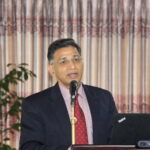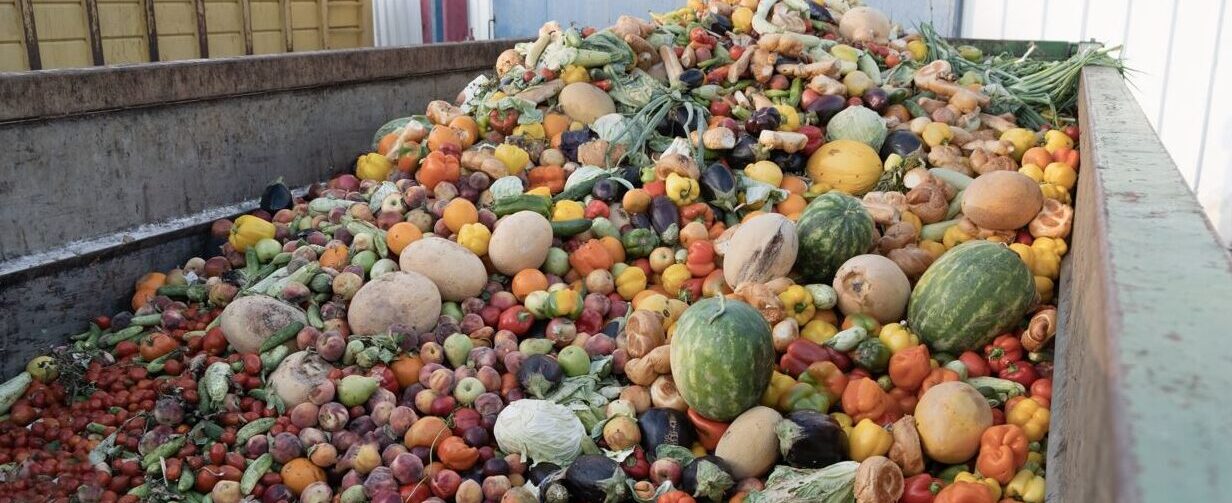On April 25, 2024, IFPRI and the USAID-funded Comprehensive Action for Climate Change Initiative (CACCI), led by Abt Global, jointly organized the national consultation, “Food Loss and Waste Management for Productivity Gains, Food Security, Nutrition, and Climate Resilient Agrifood Value Chains in Bangladesh” in Dhaka, Bangladesh. The consultation aimed to discuss the status of food loss and waste in Bangladesh and to brainstorm effective strategies for reducing food loss and waste in the country. The outcome of the consultation will help 1) generate evidence to update the Nationally Determined Contributions (NDCs) and National Action Plans (NAPs), 2) design strategic interventions, and 3) raise awareness on the importance of reducing food loss and waste for addressing food insecurity, malnutrition, and climate change impacts through adaptation and mitigation.
Summary
In his welcome address, Dr. Akhter Ahmed, IFPRI Country Representative for Bangladesh, emphasized the importance of the consultation amid evolving food systems and climate change. He noted that perishable commodities like fruits and vegetables are prone to food loss and waste due to improper processing, storage, and transportation. Dr. Ahmed added that enhancing value chains is crucial for minimizing wastage of perishable goods, and can ultimately lead to greater food availability at more affordable prices, particularly benefiting low-income households. He concluded that addressing food loss and waste is a top priority in IFPRI's fight against hunger and malnutrition in Bangladesh and globally.

Mr. Ram Ganesan, Chief of Party, USAID-funded Feed the Future Bangladesh Nutrition Activity, Abt Associates, introduced CACCI, which aims to support governments in developing programs and policies to adapt to climate change, facilitating their compliance with climate commitments outlined in the Paris Agreement. He explained that the Feed the Future Bangladesh Nutrition Activity aims to minimize food loss and ensure more nutritious food for Bangladeshis. Mr. Ganesan closed by reiterating the urgency of identifying the most effective strategies to reduce emissions caused by food loss and waste.
 Dr. Suresh Babu, Senior Research Fellow and Head of Capacity Strengthening, IFPRI, provided an overview of CACCI’s country-level plans and progress in Asia. He also emphasized how reducing food loss and waste can serve as a pathway for reducing greenhouse gas emissions.
Dr. Suresh Babu, Senior Research Fellow and Head of Capacity Strengthening, IFPRI, provided an overview of CACCI’s country-level plans and progress in Asia. He also emphasized how reducing food loss and waste can serve as a pathway for reducing greenhouse gas emissions.
Dr. Kamrul Hasan, Consultant, Food and Agriculture Organization of the United Nations (FAO), and Professor, Bangladesh Agricultural University, examined the status of food loss and waste in Bangladesh. While there is a global commitment to halve food loss and waste by 2030, approximately one-third of total production is lost or wasted globally, with the largest losses in meat, fruits, vegetables, roots, and tubers. In Bangladesh, these include high losses of paddy and animal products, as well as waste among wealthy households. Dr. Hasan noted various potential remedies, such as improved production practices, enhanced storage infrastructure, and increased sensitization for consumers, and the urgent need for coordinated action across the food value chain in Bangladesh.
 Mr. Md. Masud Karim, Director General (Additional Secretary), Department of Agricultural Marketing (DAM), affirmed that reducing food loss and waste is a policy priority, offering dual benefits of helping the most vulnerable and creating new livelihood opportunities, while also enhancing food security and nutrition and contributing to efforts to reduce greenhouse gas emissions. He acknowledged that food loss and waste has implications in several other related sectors.
Mr. Md. Masud Karim, Director General (Additional Secretary), Department of Agricultural Marketing (DAM), affirmed that reducing food loss and waste is a policy priority, offering dual benefits of helping the most vulnerable and creating new livelihood opportunities, while also enhancing food security and nutrition and contributing to efforts to reduce greenhouse gas emissions. He acknowledged that food loss and waste has implications in several other related sectors.
Key Takeaways
Several discussions took place on enhancing agricultural productivity and efficiency to prevent food loss and waste, as well as on the food security and nutrition benefits of minimizing such losses. Key takeaways included the following:
- First, there is a demand for climate-smart solutions to address increasing food loss and waste caused by extreme weather events in Bangladesh. Participants emphasized crop diversification to mitigate farmers' risks from emerging pests like fall armyworm, diseases, and adverse weather. They also highlighted precision agriculture's potential to boost efficiency and yields while minimizing environmental impact through technology and data analysis. Suggestions also included focusing on mitigating water scarcity and conserving vital resources like energy and fertilizer. Furthermore, revising the fertilizer subsidy policy is crucial to reduce environmental impact. As countries in South Asia and globally confront climate change challenges, participants stressed the importance of cross-border knowledge sharing and private sector investments in climate-smart solutions.
- Second, participants stressed the importance of tackling storage losses throughout food value chains. There has been
 encouraging progress in establishing specialized low-energy storage facilities for perishable items such as onions and potatoes, and a DAM representative mentioned plans for establishing multipurpose and cold storage facilities across districts. Participants urged that alternative storage systems be explored and data collection enhanced. Likewise, Ruhul Amin Talukder, Senior Policy Advisor, IFPRI, proposed piloting storage initiatives with options for generating scalable evidence on technical, economical and operational effectiveness. He also emphasized on mobilizing investments to foster primary as well as secondary processing of fresh produce in a way to creating additional demand during the harvest and thereby contributing to reducing loss and stabilizing prices. Participants also suggested evaluating existing technologies and implementing cost-effective solutions, such as insulators and humidifiers, to enhance the shelf life of produce.
encouraging progress in establishing specialized low-energy storage facilities for perishable items such as onions and potatoes, and a DAM representative mentioned plans for establishing multipurpose and cold storage facilities across districts. Participants urged that alternative storage systems be explored and data collection enhanced. Likewise, Ruhul Amin Talukder, Senior Policy Advisor, IFPRI, proposed piloting storage initiatives with options for generating scalable evidence on technical, economical and operational effectiveness. He also emphasized on mobilizing investments to foster primary as well as secondary processing of fresh produce in a way to creating additional demand during the harvest and thereby contributing to reducing loss and stabilizing prices. Participants also suggested evaluating existing technologies and implementing cost-effective solutions, such as insulators and humidifiers, to enhance the shelf life of produce. - Third, participants emphasized the need to strengthen market linkages to mitigate food loss, particularly for smallholder farmers. They noted that several actions could be considered to ensure that farmers have a reliable market for their produce, which would help to prevent spoilage. Research could identify competitive products suitable for the export market, which can be reviewed on a routine basis (e.g., every five years). Alternatively, the government could purchase surplus rice, wheat, maize, pulses, and jute; government purchases would both provide guarantees for farmers and help stabilize prices. Given the significant food waste occurring at restaurants, heightened awareness and innovative incentive schemes may be necessary to curb waste, potentially drawing from best practices in other countries.
Dr. Suresh Babu, IFPRI, delivered the closing remarks, thanking the organizing team and the participants. He highlighted that the outcomes of the consultation will be documented and will be used in the process of updating the NDCs and NAPs that Bangladesh is currently undertaking. Furthermore, the consultation report will help with devising the appropriate interventions in food value chains and create awareness among farmers, consumers, and intermediaries.
This blog has been cross-posted from here.
Sadat Anowar and Raisa Shamma are Research Analysts in the Poverty, Gender, and Inclusion (PGI) Unit, IFPRI. Julie Ghostlaw is a Country Program Manager, PGI, IFPRI.



